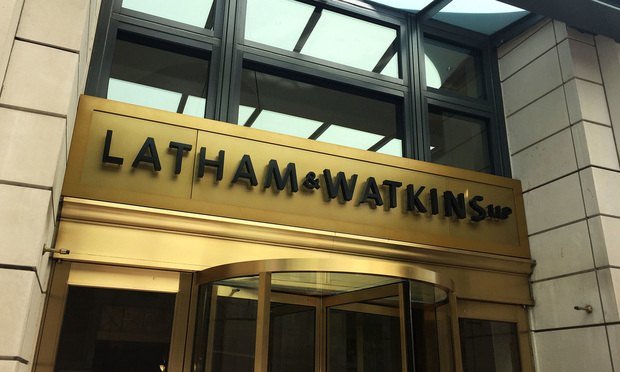Daily Dicta: Cooley Takes Aim at Latham in Fierce DQ Fight
Motions to disqualify strike at perhaps the most sacred duties a lawyer owes a client—loyalty and confidentiality. It's not nice to have either one questioned. It's also not nice to get bounced off a case—especially if it's a juicy $250 million lawsuit.
May 31, 2020 at 09:44 PM
7 minute read

No one likes motions to disqualify.
Not the lawyers bringing them (unless they're jerks, or afraid of opposing counsel)—and certainly not the lawyers defending against them.
After all, the accusations strike at perhaps the most sacred duties a lawyer owes a client—loyalty and confidentiality. It's not nice to have either one questioned.
It's also not nice to get bounced off a case—especially if it's a juicy $250 million lawsuit.
But in a blistering motion filed last week in San Diego County Superior Court, litigators from Cooley say opposing counsel from Latham & Watkins are impossibly conflicted and must step aside in a high-profile fraud case involving Chicago Title Co. and Chicago Title Insurance Co.
 A Latham spokeswoman said the firm will oppose the motion, but declined further comment.
A Latham spokeswoman said the firm will oppose the motion, but declined further comment.
Latham lawyers in another matter last week got sent packing by Senior Judge Eric Bruggink in the U.S. Court of Federal Claims. In disqualifying the firm as counsel to Quantico Tactical Inc. in a bid protest fight with Atlantic Diving Supply, Inc., Burggink wrote that Latham "billed hundreds of hours and switched clients…Latham may not now represent an adverse party in matters that directly relate to its prior representation."
Will it happen again?
To understand the current battle, we have to go back to the firm's work for Chicago Title—a subsidiary of the $13 billion Fidelity National Insurance Inc. —from 2008 to 2012.
During that time, about 80 Latham timekeepers allegedly devoted more than 41,000 hours and billed almost $17 million in fees as lead counsel to defend the company in another fraud case in San Diego.
Chicago Title was sued by investors in connection with a widely-publicized real estate Ponzi scheme by San Diego financial planner Rollo Richard Norton II, who was sentenced to two years in prison in 2010. The investors alleged that Chicago Title employees in San Diego knowingly assisted and/or turned a blind eye toward Norton's scheme.
The case went to trial in 2010. According to Cooley's motion, one of Latham's key litigators—partner John "Jake" Ryan—billed more than 3,800 hours on the case, and was in court every day of the trial.
A former global vice-chair of Latham's complex commercial litigation practice, Ryan in his Latham bio prominently touts the representation without naming the client: "Complete defense verdicts against 14 of 17 plaintiffs following a 4½-month financial fraud jury trial in San Diego Superior Court."
Also—and this makes me a little sad—he started his legal career in 2000 as a Cooley associate.
Can't we all just get along?
Instead, Ryan is now opposed not just to his former colleagues, but also to Chicago Title. And that's where the DQ motion hits home.
"Latham has switched sides, pursuing claims against its former clients, armed with deep and extensive knowledge of and insight into a wealth of confidential and highly sensitive information that it acquired during its prior representation," wrote Cooley partner Steven Strauss, labeling it a "a startling ethical breach."
Latham now represents San Diego real estate developer Kim Peterson and related entity Kim Funding, which are suing Chicago Title for fraud in connection with another alleged Ponzi scheme.
The details of this scam are different—the new allegations involve short-term, high-interest "bridge loans" to liquor license applicants. According to Latham's complaint, which was signed by Ryan, Chicago Title conspired with San Diego businesswoman, restaurateur and real estate investor Gina Champion-Cain to concoct a fraudulent liquor license escrow program.
Latham's client Peterson put up much of the money, personally guaranteeing $100 million in loans, believing the money was being safely held in escrow by Chicago Title.
In reality, the Latham lawyers allege, the program was a fraud, and served as "a slush fund bank account for Champion-Cain," who used the money for herself.
There's all sorts of related litigation pending, but Peterson in his suit focuses on Chicago Title's role. How could they allow this to happen?
It's a darn good question—but one that's complicated by Latham's past representation of the company.
It's true that Latham's primary work defending Chicago Title took place 10 years ago. The firm might argue that the passage of time erases the conflict.
But Cooley in its DQ motion claims the work is still directly relevant.
The over-arching allegations are the same—that Chicago Title "created 'sham' escrow accounts to improperly disburse funds to the perpetrators of the frauds," Strauss wrote. "Similarly, both cases allege that [Chicago Title] ignored indicia of the underlying fraud while providing escrow services when it knew or should have known the transactions were shams."
He continued, "And while the two matters arose some years apart, there is no question that many of the same policies and practices are at issue in both."
In addition, many of the same executives, including Fidelity's chief compliance officer, chief operating officer, chief legal officer and national escrow administrator, are likely to be called as witnesses. Latham prepped Fidelity's CFO and COO for their testimony in the Norton case and defended them in their depositions—"and thus would inevitably have been privy to confidential information, not to mention insights into their strengths and weaknesses as witnesses," Strauss wrote.
There's also the relationship between Chicago Title Co. and Chicago Title Insurance—is the latter the alter ego of the former?
"Having vigorously defended Chicago Title Insurance against alter ego and agency claims in the Norton matter, even to the point of filing a separate trial brief, Latham will be able to use confidential information it gained about the relationship between CTC and Chicago Title Insurance to pursue the same claim here," Strauss wrote.
Latham's Ryan also worked closely Mark Schiffman, Fidelity's deputy chief legal officer managing litigation. That made Ryan privy to the company's "methodology for assessing settlement offers to plaintiffs with particular damages characteristics," Strauss wrote. "The depth of Latham's possession of extraordinarily sensitive information about CTC's litigation strategy cannot be overstated."
Plaintiffs in related litigation against Chicago Title and Gina Champion-Cain have already drawn parallels between the cases.
Plaintiff's lawyer Michael Kirby of Kirby & Kirby, for example, wrote in court papers that "The lack of competent internal controls and audits at the San Diego office of Chicago Title is even more inexcusable because during the 2007-2010 time period, Chicago Title was involved in another Ponzi scheme which resulted in years of litigation and Chicago Title being held responsible for fraud, investor losses and punitive damages."
Strauss in an interview noted that "Latham refused to meaningfully meet and confer or withdraw as counsel for Kim Peterson and Kim Funding," he said. "Disqualification is required for Latham's egregious breach of loyalty to its former client, Chicago Title and to reinforce that lawyers cannot switch sides."
This content has been archived. It is available through our partners, LexisNexis® and Bloomberg Law.
To view this content, please continue to their sites.
Not a Lexis Subscriber?
Subscribe Now
Not a Bloomberg Law Subscriber?
Subscribe Now
NOT FOR REPRINT
© 2025 ALM Global, LLC, All Rights Reserved. Request academic re-use from www.copyright.com. All other uses, submit a request to [email protected]. For more information visit Asset & Logo Licensing.
You Might Like
View All
Litigators of the Week: The Eighth Circuit Knocks Out a $564M Verdict Against BMO in Ponzi Case

Litigators of the Week: Second Circuit Tells Argentina to Turn Over More Than $300M to Bondholders

How One of the World's Largest Institutional Investors Approaches Litigation

Big Law and Litigation Finance Seem to Be Having a Moment
Law Firms Mentioned
Trending Stories
- 1Decision of the Day: Judge Dismisses Defamation Suit by New York Philharmonic Oboist Accused of Sexual Misconduct
- 2California Court Denies Apple's Motion to Strike Allegations in Gender Bias Class Action
- 3US DOJ Threatens to Prosecute Local Officials Who Don't Aid Immigration Enforcement
- 4Kirkland Is Entering a New Market. Will Its Rates Get a Warm Welcome?
- 5African Law Firm Investigated Over ‘AI-Generated’ Case References
Who Got The Work
J. Brugh Lower of Gibbons has entered an appearance for industrial equipment supplier Devco Corporation in a pending trademark infringement lawsuit. The suit, accusing the defendant of selling knock-off Graco products, was filed Dec. 18 in New Jersey District Court by Rivkin Radler on behalf of Graco Inc. and Graco Minnesota. The case, assigned to U.S. District Judge Zahid N. Quraishi, is 3:24-cv-11294, Graco Inc. et al v. Devco Corporation.
Who Got The Work
Rebecca Maller-Stein and Kent A. Yalowitz of Arnold & Porter Kaye Scholer have entered their appearances for Hanaco Venture Capital and its executives, Lior Prosor and David Frankel, in a pending securities lawsuit. The action, filed on Dec. 24 in New York Southern District Court by Zell, Aron & Co. on behalf of Goldeneye Advisors, accuses the defendants of negligently and fraudulently managing the plaintiff's $1 million investment. The case, assigned to U.S. District Judge Vernon S. Broderick, is 1:24-cv-09918, Goldeneye Advisors, LLC v. Hanaco Venture Capital, Ltd. et al.
Who Got The Work
Attorneys from A&O Shearman has stepped in as defense counsel for Toronto-Dominion Bank and other defendants in a pending securities class action. The suit, filed Dec. 11 in New York Southern District Court by Bleichmar Fonti & Auld, accuses the defendants of concealing the bank's 'pervasive' deficiencies in regards to its compliance with the Bank Secrecy Act and the quality of its anti-money laundering controls. The case, assigned to U.S. District Judge Arun Subramanian, is 1:24-cv-09445, Gonzalez v. The Toronto-Dominion Bank et al.
Who Got The Work
Crown Castle International, a Pennsylvania company providing shared communications infrastructure, has turned to Luke D. Wolf of Gordon Rees Scully Mansukhani to fend off a pending breach-of-contract lawsuit. The court action, filed Nov. 25 in Michigan Eastern District Court by Hooper Hathaway PC on behalf of The Town Residences LLC, accuses Crown Castle of failing to transfer approximately $30,000 in utility payments from T-Mobile in breach of a roof-top lease and assignment agreement. The case, assigned to U.S. District Judge Susan K. Declercq, is 2:24-cv-13131, The Town Residences LLC v. T-Mobile US, Inc. et al.
Who Got The Work
Wilfred P. Coronato and Daniel M. Schwartz of McCarter & English have stepped in as defense counsel to Electrolux Home Products Inc. in a pending product liability lawsuit. The court action, filed Nov. 26 in New York Eastern District Court by Poulos Lopiccolo PC and Nagel Rice LLP on behalf of David Stern, alleges that the defendant's refrigerators’ drawers and shelving repeatedly break and fall apart within months after purchase. The case, assigned to U.S. District Judge Joan M. Azrack, is 2:24-cv-08204, Stern v. Electrolux Home Products, Inc.
Featured Firms
Law Offices of Gary Martin Hays & Associates, P.C.
(470) 294-1674
Law Offices of Mark E. Salomone
(857) 444-6468
Smith & Hassler
(713) 739-1250






